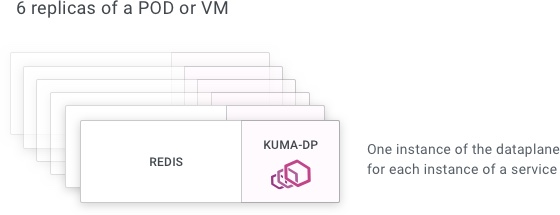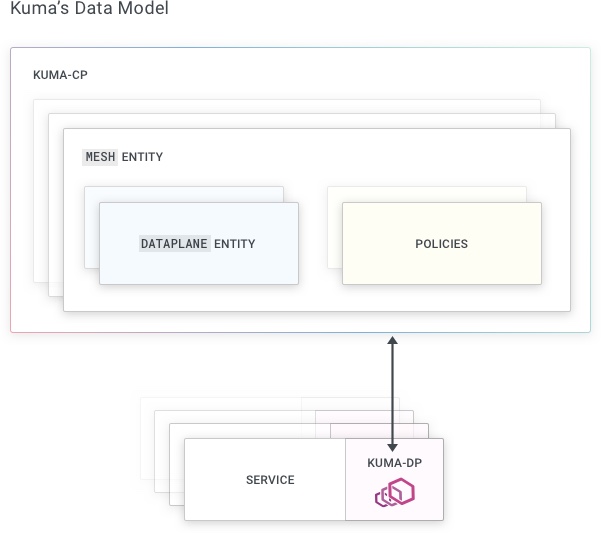このページは、まだ日本語ではご利用いただけません。翻訳中です。
旧バージョンのドキュメントを参照しています。 最新のドキュメントはこちらをご参照ください。
Data plane proxy
A data plane proxy (DPP) is the part of Kong Mesh that runs next to each workload that is a member of the mesh. A DPP is composed of the following components:
- a
Dataplaneentity defines the configuration of the DPP - a
kuma-dpbinary runs on each instance that is part of the mesh. This binary spawns the following subprocesses:-
Envoyreceives configuration from the control-plane to manage traffic correctly -
core-dnsresolves Kong Mesh specific DNS entries
-
Data plane proxies are also called sidecars.
We have one instance of kuma-dp for every instance of every service.

Concepts
Inbound
An inbound consists of:
- a set of tags
- the port the workload listens on
Most of the time a DPP exposes a single inbound. When a workload exposes multiple ports, multiple inbounds can be defined.
Tags
Tags are a set of key-value pairs (.e.g version=v2) that are defined for each DPP inbound. These tags serve the following purposes:
- specifying the service this DPP inbound is part of
- adding metadata about the exposed service
- allowing subsets of DPPs to be selected by these tags
Tags prefixed with kuma.io are reserved:
-
kuma.io/serviceidentifies the service name. On Kubernetes this tag is automatically created, while on Universal it must be specified manually. This tag must always be present. -
kuma.io/zoneidentifies the zone name in a multi-zone deployment. This tag is automatically created and cannot be overwritten. -
kuma.io/protocolidentifies the protocol of the service exposed by this inbound. Accepted values aretcp,http,http2,grpcandkafka.
Service
A service is a group of all DPP inbounds that have the same kuma.io/service tag.
Outbounds
An outbound allows the workload to consume a service in the mesh using a local port. This is only useful when not using (/mesh/2.7.x/production/dp-config/transparent-proxying/).
Dataplane entity
The Dataplane entity consists of:
- the IP address used by other DPPs to connect to this DPP
- inbounds
- outbounds
A Dataplane entity must be present for each DPP. Dataplane entities are managed differently depending on the environment:
- Kubernetes: The control plane automatically generates the
Dataplaneentity. - Universal: The user defines the
Dataplaneentity.
Dynamic configuration of the data plane proxy
When the DPP runs:
- The
kuma-dpretrieves Envoy startup configuration from the control plane. - The
kuma-dpprocess starts Envoy with this configuration. - Envoy connects to the control plane using XDS and receives configuration updates when the state of the mesh changes.
The control plane uses policies and Dataplane entities to generate the DPP configuration.

Data plane proxy ports
The kuma-dp process and its child process offer a number of services, these services need to listen to a few ports to provide their functionalities.
When we start a data-plane via kuma-dp we expect all the inbound and outbound service traffic to go through it. The inbound and outbound ports are defined in the dataplane specification when running in universal mode, while on Kubernetes the service-to-service traffic always runs on port 15001.
In addition to the service traffic ports, the data plane proxy also opens the following ports:
- TCP
-
9901: the HTTP server that provides theEnvoyadministration interface, It’s bound onto the loop-back interfaces, and can be customized using these methods:- On Universal: data field
networking.admin.porton the data plane object - On Kubernetes: pod annotation
kuma.io/envoy-admin-port
- On Universal: data field
-
9000: the HTTP server that provides the Virtual Probes functionalities. It is automatically enabled onKubernetes; on Universal, it needs to be enabled explicitly.
-












